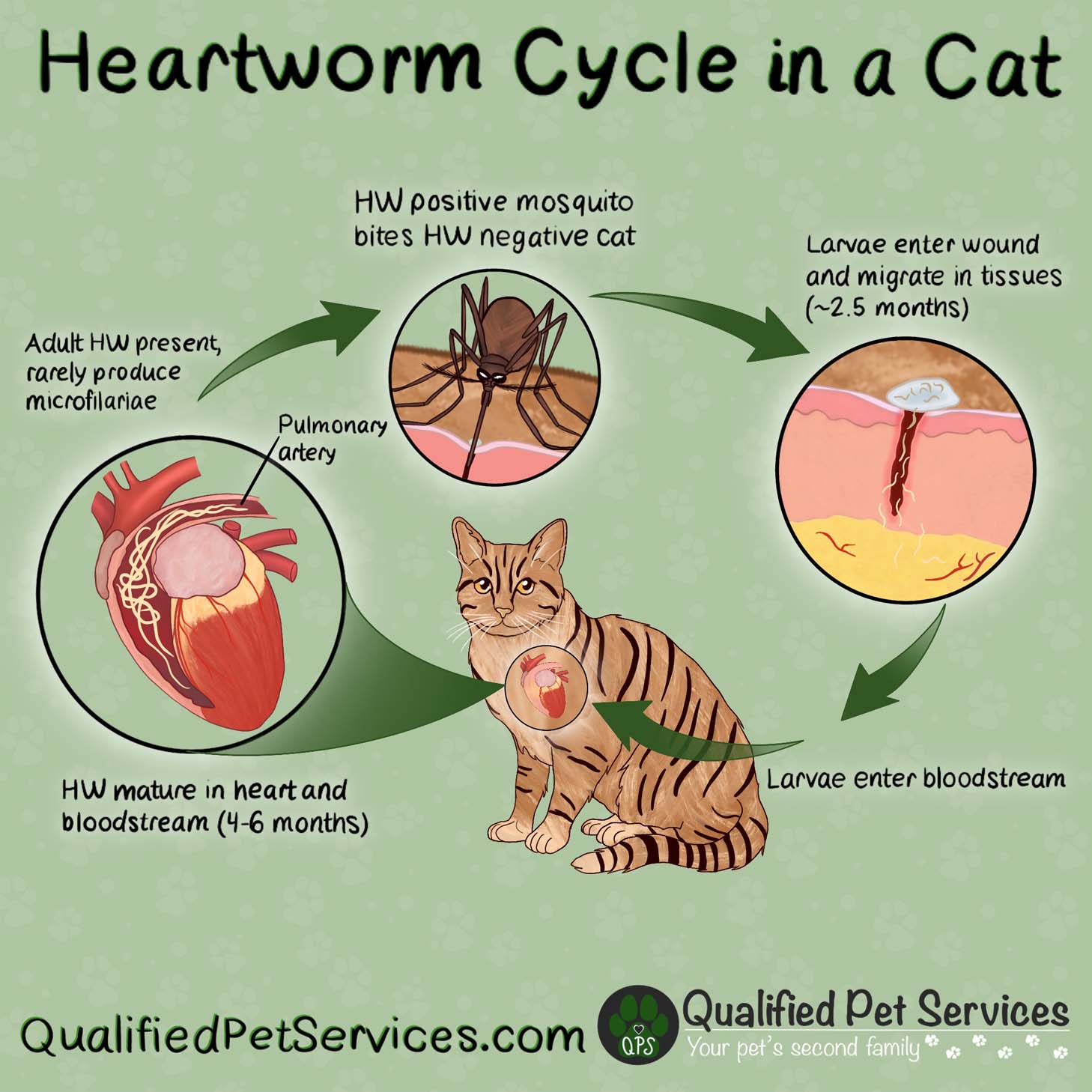
Safeguarding Feline Health
While heartworm disease is commonly associated with dogs, it’s vital to recognize that cats are also at risk of this potentially life-threatening condition. Unlike dogs, heartworm disease is not curable in cats, underscoring the critical importance of preventive measures. In this comprehensive article, we’ll delve into the ins and outs of heartworm disease in cats, elucidate the reasons behind the necessity of heartworm prevention, and emphasize why vigilance is paramount to ensuring the well-being of our beloved feline companions.
Understanding Heartworm Disease in Cats
Heartworm disease, caused by the parasitic worm Dirofilaria immitis, is primarily transmitted through mosquito bites. Although cats are not the primary hosts for these worms, they can still fall victim to this serious ailment. Once infected, these worms mature within the heart and blood vessels of the lungs, causing damage and potentially fatal consequences for the cat. Understanding this life cycle underscores the urgency of preventative measures, as it showcases the ease with which cats can contract this disease, even if they spend most of their time indoors.
Distinct Challenges Faced by Cats
Unlike in dogs, where the presence of numerous worms can result in heartworm disease, cats usually have fewer worms present. However, even a small number of worms can cause significant damage due to the cat’s smaller size. Additionally, cats are considered atypical hosts for heartworms, complicating diagnosis as the presence of worms may be elusive. This highlights the necessity of routine preventive measures, as even a seemingly healthy cat could harbor these harmful parasites without overt symptoms, making early intervention all the more critical.
Subtle Symptoms and Challenges in Diagnosis
Cats infected with heartworms may exhibit subtle or vague symptoms, further complicating the diagnosis. Common signs include coughing, vomiting, lethargy, and difficulty breathing. Unfortunately, these symptoms are often misinterpreted as other ailments, leading to delays in diagnosis and treatment. Therefore, regular visits to a veterinarian and diligent observation of your cat’s behavior are crucial for early detection, allowing timely intervention and enhancing the likelihood of a positive outcome.
The Significance of Heartworm Prevention in Cats
The Lack of a Cure
One of the primary reasons heartworm prevention is paramount for cats is the absence of a cure. Unlike in dogs, there is no approved treatment for heartworm disease in cats. Once infected, managing the condition becomes a challenging task, with focus on alleviating symptoms rather than eliminating the worms. This underscores the critical nature of prevention, as once a cat contracts heartworm disease, their quality of life and overall health may be permanently compromised, making proactive steps all the more imperative.
The Emphasis on Prevention
Given the lack of curative treatment options, prevention emerges as the most effective strategy. Heartworm prevention medications specifically formulated for cats are available and should be administered consistently. These specialized medications are designed to provide tailored protection to cats, offering a proactive shield against heartworm disease’s potentially devastating consequences. By staying committed to a regular preventive regimen, you’re not only safeguarding your cat’s immediate health but also ensuring their longevity and overall well-being.
Minimizing Risk and Preventing Damage
Engaging in regular heartworm prevention not only protects cats from the debilitating effects of heartworm disease but also minimizes the risk of other potential health issues stemming from worm-related damage. Furthermore, by proactively preventing heartworm infection, you’re providing your feline companion with a stronger immune system and overall better health. This preventive approach sets the foundation for a happier and more vibrant life for your beloved cat.
Ease of Administration
Preventive measures are typically administered monthly, in the form of chewable tablets or topical treatments. These methods are straightforward to administer and can easily be incorporated into your cat’s routine. Regular administration of these preventive medications not only ensures their effectiveness but also establishes a consistent schedule that strengthens the shield against heartworm disease. By making prevention a seamless part of your cat’s routine, you’re taking a proactive step to safeguard their health and provide long-lasting protection.
Long-Term Cost-Efficiency
Opting for heartworm prevention is not only beneficial for your cat’s health but also economical in the long run. Treating heartworm disease is significantly more costly and complex than preventive measures. By choosing prevention, you not only save on potential medical expenses but also spare your cat from the discomfort, stress, and potential complications that come with heartworm treatment. Prioritizing prevention is an investment in your cat’s well-being and peace of mind for both you and your furry companion.
A Considerable Threat to Cats
Heartworm disease poses a considerable threat to cats, and its lack of curability emphasizes the importance of proactive measures. Feline companions deserve the same level of protection as their canine counterparts. With readily available heartworm prevention medications tailored to cats, responsible pet owners have the means to shield their feline friends from this potentially fatal condition. By choosing prevention, you’re not just making a decision for your cat’s current well-being; you’re also ensuring their longevity, health, and the quality of life they deserve. The commitment to prevention is an investment in a vibrant and thriving future for your beloved cat, allowing them to enjoy each day to the fullest without the looming threat of heartworm disease.
Sources:
- American Heartworm Society. (n.d.). Heartworm Basics. https://www.heartwormsociety.org/pet-owner-resources/heartworm-basics
- American Veterinary Medical Association. (n.d.). Heartworm Disease in Cats. https://www.avma.org/resources/pet-owners/petcare/heartworm-disease-cats
- Companion Animal Parasite Council. (n.d.). Cats and Heartworm Disease. https://capcvet.org/guidelines/heartworm/regions/cat-heartworm/
- Cornell University College of Veterinary Medicine. (n.d.). Heartworm Disease in Cats. https://www.vet.cornell.edu/departments-centers-and-institutes/cornell-feline-health-center/health-information/feline-health-topics/heartworm-disease-cats
Need a Cat Sitter?
Fill out a Booking Request!


